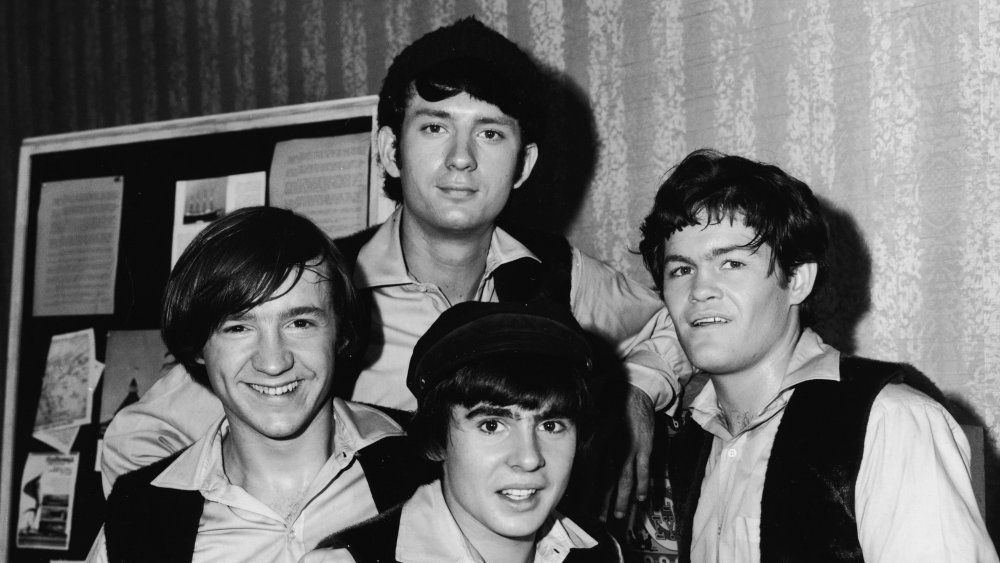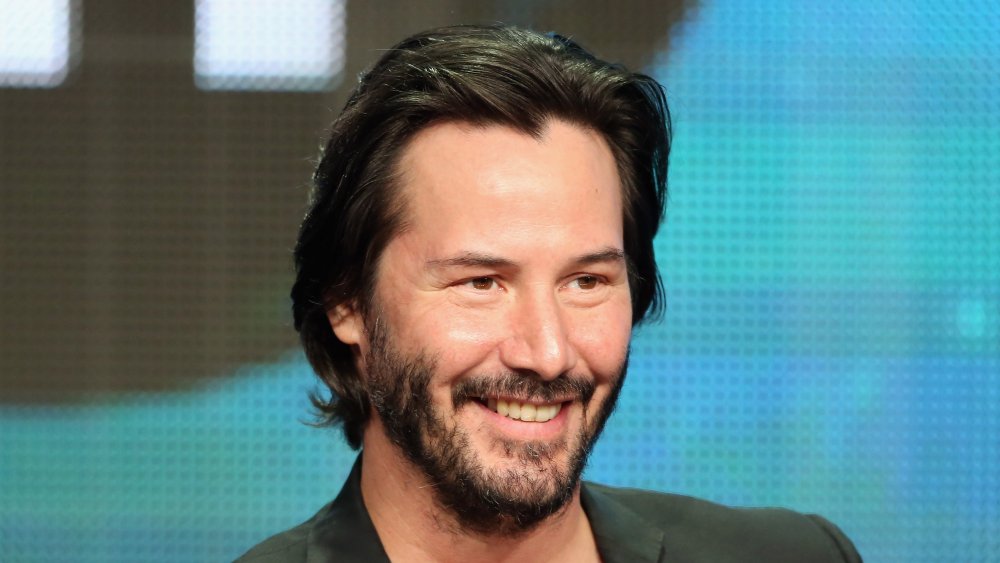The Untold Truth Of Weezer
When you think of a rock band from Los Angeles, Weezer is pretty much the last thing that fits the image. Yet the years have proven the group to be one of the more enduring bands to emerge from the city's ever-boiling rock 'n' roll scene. Their combination of great songs, self-consciously nerdy image, and kooky, self-deprecating brand of humor has helped the band stay relevant (or at least visible) since its conception in 1992, save for a small hiatus at the turn of the millennium. It's also enabled them to do pretty much what they want musically. After all, what other rock group can believably flirt with heavy metal riffs, chirpy pop, abrasive alt-rock sound, and even Toto's Africa while remaining completely on brand?
As befits a band of their tenure and stature, Weezer has gone through a lot of ups and downs over the years, and there are probably a few twists and turns in their history that you've never heard of. Let's fix that and take a look at the untold truth of Weezer.
What exactly is a 'Weezer?'
All right, we'll just ask it. What in the world is a 'Weezer,' anyway? Even the most nonsensical band names can usually be tracked down to a word or phrase, but the meaning behind Weezer is so well-hidden, it almost seems like a completely original word. According to the book Is Tiny Dancer Really Elton's Little John?: Music's Most Enduring Mysteries, Myths, and Rumors Revealed (via RuleFortyTwo), however, the moniker is actually an old nickname of band leader Rivers Cuomo.
Cuomo has asthma, and when he was young, other kids gave him a hard time about all his "wheezing." The frontman decided to resurrect the name when his then-nameless group scored their first gig. It was hardly a slam dunk, though. The band had a "long meeting" where they considered several other names, but since no one else could conjure up a better one, Weezer remained at the top of the pile.
Weezer's embarrassing proto-phases
Every musician starts somewhere, but the list of bands that Weezer's Rivers Cuomo played in almost seems like a parody of a rock star's coming-of-age story. As the book Is Tiny Dancer Really Elton's Little John? (via RuleFortyTwo) tells us, Cuomo started as a high school metalhead in a band called Avant Garde, which was later renamed Zoom (they also considered the name Power Chicken, but unfortunately decided against it). When Avant Garde/Zoom/almost-Power Chicken broke up, Cuomo's next band was the gloriously named Sixty Wrong Sausages, which eventually became Weezer. Again, several glorious names such as Meathead, Outhouse, The Big Jones, and This Niblet were considered, but they were left tragically unused.
The most significant difference between the proto-Weezer Cuomo and the Buddy Holly-spectacled nerd rocker we know today was ... frankly, everything. As Rolling Stone notes, young Cuomo was a metalhead guitar player with a majestic glam metal hairdo, which eventually evolved into a more conventional heavy metal mane that still framed his head during the first Weezer shows. As he looked for his own image as an artist, Cuomo also went through a phase where he seemed to imitate assorted famous rock vocalists. There are early recordings where he clearly tries to sing like Jane's Addiction's Perry Farrell, and at one point, he even performed while wearing Axl Rose-style bicycle shorts. Fortunately, he grew out of it.
Their reputation as 'indie Monkees'
While Weezer has stood the test of time and is now considered a perfectly legitimate band, Rolling Stone tells us things weren't quite that happy when the group took its first steps in the scene. Their emergence was extremely fast, and they'd already found a pretty great alt-rock sound, which many members of the scene (and rock journalists) found extremely suspicious. Rivers Cuomo still has less than fond memories of a local paper that called them "Stone Temple Pixies." This was quite an insult. Since the Stone Temple Pilots were seen as a "corporate copy of all the cool grunge bands," the story essentially claimed that Weezer was a manufactured version of the Pixies.
It wasn't just the music media, either. Alt-rock groups like Pavement and Urge Overkill tended to assume that Weezer's lack of "credible" indie releases and fast rise to fame meant that they were basically "indie Monkees" (the Monkees were a manufactured, record company copy of the Beatles). The Urge Overkill guys once even asked a Weezer member whether they were put together by cynical record company executives.
Of course, Weezer wasn't an artificial record company product. The band barely had time to hone their sound in nameless obscurity before a "perfect storm" of things went their way. Cuomo "reinvented" himself into a hit-writing machine in an incredibly short time, and everything clicked just so, which allowed their debut album to deliver a maximum impact.
The Keanu effect
In a small, strange way, Weezer as we know it was brought to you by none other than Keanu Reeves. As Spin tells us, their first gig was in 1992, and they played as part of the lineup with Reeves' band Dogstar. It wasn't a particularly glamorous concert, as they were the close-out at after Dogstar, and all the beautiful girls in the front row mysteriously evaporated when the Hollywood hunk's band ended their set.
According to Is Tiny Dancer Really Elton's Little John? (via RuleFortyTwo), the Dogstar gig, which took place in Raji's Bar and Ribshack on Hollywood Boulevard, was a very Keanu type of deal. It was a laid-back, "impromptu" thing, and Weezer pretty much "lucked" into the lineup. Incidentally, the concert is also responsible for Weezer's name, as the then-unnamed band hadn't really decided what to call themselves. It turns out bands need a name before they hit the stage, and Cuomo came up with the name "Weezer," which, of course, ultimately stuck. So depending on what you think of the band and the name, you can either thank or boo Keanu Reeves.
One of Weezer's most famous songs was a Metallica rip-off
The first true Weezer song Rivers Cuomo ever wrote was "Undone — The Sweater Song," as Rolling Stone tells us. It was also released as the band's debut single in 1994. Strangely, though, it wasn't exactly an original song. As Cuomo himself will tell you, it was quite the opposite.
According to the Weezer main man, "Undone — The Sweater Song" was a conscious attempt to write a song that would evoke a Velvet Underground vibe, seeing as he was a massive fan of Lou Reed's group. However, several years after writing, recording, and releasing the tune, Cuomo came to realize that he'd actually created "almost a complete ripoff" of the Metallica standard "Welcome Home (Sanitarium)." It takes skill to try and emulate one classic band and end up copying the playbook of another trailblazer of a completely different genre, but as Cuomo sees it, this is par for the course for his band. "It just perfectly encapsulates Weezer to me," he says. "You're trying to be cool like Velvet Underground, but your metal roots just pump through unconsciously."
Weezer was once offered $10 million to break up
Weezer's ever-shifting musical sensibilities are a point of contention with some fans, and listeners haven't been above making their feelings clear. As Entertainment Weekly tells us, in 2010, a particularly enterprising man named James Burns was so fed up with Rivers Cuomo's group that he offered to pay Weezer a cool $10 million just to break up. Of course, he wasn't about to pony up the money himself. Like so many strange things in the modern world, this was a crowdfunding deal. Curiously, Burns said he's not even much of a Weezer fan, and he was just fed up with the constant media presence of a band that he felt was roughly 15 years past their "best before" date. "Every year, Rivers Cuomo swears that he's changed, and that their new album is the best thing that he's done since Pinkerton, and what happens?" Burns asked. "Another pile of crap like 'Beverly Hills' or 'I'm Your Daddy.' This is an abusive relationship, and it needs to stop now."
Weezer's drummer Patrick Wilson eventually found out about Burns' crowdfunding attempt, and he good-naturedly commented on Twitter, "If they can make it 20, we'll do the 'deluxe breakup'!" He was probably right to be unconcerned. While a handful of people indeed pitched a combined couple of hundred toward Weezer's break-up, the attempt seems to have gone the way of the dodo since then.
Their breakout hit was almost left off the album
Everyone who's familiar with Weezer (and a good bunch of people who aren't) know that music video. Yeah, we're talking about the Spike Jonze-directed promotional clip for their 1994 single "Buddy Holly," which features the band playing a gig at Al's Diner, the central setting of Happy Days, with all the show's major characters attending the show thanks to clever editing. The video, along with the fact that "Buddy Holly" is an incredibly catchy song, played a large part in propelling Weezer to fame ... which makes it really strange that Rivers Cuomo wanted to leave it off the Blue Album.
According to Rolling Stone, Cuomo harbored doubts about "Buddy Holly" because he felt it was a "cheesy" novelty song. However, producer Ric Ocasek recognized a good song when he heard it, and he was having none of Cuomo's nonsense. He managed to convince the rocker to consider giving "Buddy Holly" a chance in a process that involved pep talks and at least one instance where he peppered the studio with small notes that read, "WE WANT BUDDY HOLLY." Cuomo was as equally reserved about the music video as he was the song itself. But while he personally didn't enjoy its "gimmicky" nature, he fortunately recognized the Happy Days concept as a winner. As he explained, "At once I didn't like it, and at the same time, I knew it was an amazing idea, and it had to be done."
Nirvana 'saved' Rivers Cuomo from metal and pop
When Weezer made their grand entrance with their nameless debut known as the Blue Album, their Pixies-style, alt-rock sound was so fully formed that it's easy to imagine that songwriter Rivers Cuomo grew up with this kind of music. However, as Rolling Stone tells us, this couldn't be further from the truth. Not long before Weezer became, well, Weezer, Cuomo used to think that bands like the Velvet Underground, Sonic Youth, and the Pixies sounded like "noise" and "garbage." Instead, his musical taste ran towards metal, with a secret fascination with Madonna-style pop.
Of course, it turned out that was only because Cuomo hadn't heard Nirvana yet. The future rock star's musical tastes were irrevocably changed in 1990, when he first heard the definitive grunge band's single "Sliver," and he fell in love with its combination of raw sound, peculiar "Grandma, take me home" lyrics, and catchy melody. By the time the guitar distortion came in and Cobain's screaming started, he knew what he wanted to do.
Not only did Nirvana act as Cuomo's gateway drug to alt-rock and show him the path to finding his own musical style, the band also helped him accept himself. As Weezer's founding member Jason Cropper tells us, Cobain's thick-rimmed glasses in the music video for "In Bloom" helped the Weezer frontman be more comfortable with his own spectacles.
Weezer had its own Pete Best
Many bands have their own variation of Pete Best, the Beatles drummer who was "dismissed" before they made it. Weezer is no exception. As the book River's Edge: The Weezer Story (via Rolling Stone) tells us, the band's original guitar player was one Jason Cropper, but he never got to stick around to see even a modicum of fame. Before the band's first album was out, Cropper was "asked to leave" the group. Reportedly, this harsh decision was made because Cropper had some "deeply unsettling news" that the band felt affected them all, but really, it's anyone's guess how the story actually went due to an extremely strict exit contract that forbids pretty much anyone from discussing it with anything but the broadest possible terms. However, the smart money is said to be on the theory that his girlfriend's unplanned pregnancy may have played a part.
Still, Cropper worked on the Blue Album, and he's paid for that like a full band member. He also says that he harbors no ill will toward anyone and hopes Weezer the very best ... though he does note that their success benefits him financially (likely because of the whole Blue Album thing), so he may have ulterior motives. As for Cuomo, Blue Album producer Ric Ocasek alleges the Weezer leader may keep Cropper in slightly lower regard, as Cuomo reportedly asked Ocasek after the firing if they could still remove Cropper's guitars from the already-finished album.
Rivers Cuomo's strange private life
Rivers Cuomo is the mastermind behind Weezer, and as Vulture and the Los Angeles Times reveal, he's also a rather peculiar fellow. A rock star, a Harvard alum, and a man who perpetually feels lonely, he's a restless spirit with an endless host of odd obsessions and hobbies. Sometimes, he's into coding, and he creates complex programs to feed Weezer's touring calendar and to mine Spotify for tunes that inspire and improve his own songwriting.
Other times, he's all about life hacks, peppering interviewers with information about blocking jet lag with orange shades, using electrolyte pills to improve your water intake, and avoiding social media addiction by scheduling dozens of tweets in advance in SocialPilot. Of course, he personally uses all of those hacks. He also describes himself as "the most straight-edge guy ever," despite fronting a band with numerous songs of the "Hash Pipe," "Dope Nose," and "We Are All on Drugs" variety. Oh, and he researches his own life and keeps tabs of it with a giant spreadsheet, but only the years before 2007, naturally. You understand. (You probably don't, and that's okay.)
In the book River's Edge: The Weezer Story (via Rolling Stone), former Weezer member Jason Cropper offers some insight on Cuomo's nature, saying, "It's hard to be friends with someone who is so intellectually stimulated. The guy is really creative. He's an artist and he's following that path really intensely."
The tragic fate of Mikey Welsh
Weezer isn't exactly a hard-partying band of the Rolling Stones or Mötley Crüe variety, but they still have their share of tragedies. Arguably, the biggest one is the death of bass player Mikey Welsh, who NME tells us joined the group after the original bassist Matt Sharp left. His tenure was short-lived, as he left Weezer in 2001 in the aftermath of a mental breakdown. Still, he remains a visible and important part of the Weezer history thanks to his presence on the band's Green Album and its hit songs, "Hash Pipe" and "Island in the Sun."
In 2011, Welsh was found unresponsive and lifeless in his hotel room, having suffered a heart attack in his sleep. In an eerie turn, just two weeks before the incident, he'd posted on Twitter about a dream that his heart would fatally fail on that very weekend. While this might seem creepily prescient, it must be mentioned that Welsh died of a suspected drug overdose, and he'd attempted suicide in the past. So there's a fair chance that he didn't actually see in the future as much as he was publicly revealing the day he planned to passing away.
If you or anyone you know is having suicidal thoughts, please call the National Suicide Prevention Lifeline at 1-800-273-TALK (8255).
Weezer and allegations of misogyny
People who dislike Weezer often point out the band's oddly misogynist lyrics. As BK Mag, Jezebel, and NME all note, the band (or rather Rivers Cuomo, who writes the lyrics) has a long history of immature misogyny that makes many of their songs seem like "diary entries of a high school boy," with a tendency to use the entire spectrum of the female gender as either one-dimensional objects of desire or the sources of the singer's pain and discomfort.
A lot of the "Weezer is a misogynist band" accusations focus on the group's second album, Pinkerton, which indeed contains some pretty offensive lyrics. According to Rolling Stone, though, Cuomo did address them before the album even came out via a message to the band's fan club. "There are some lyrics on the album that you might think are mean or sexist," he wrote. "I will feel genuinely bad if anyone feels hurt by my lyrics, but I really wanted these songs to be an exploration of my 'dark side' — all the parts of myself that I was either afraid or embarrassed to think about before. So there's some pretty nasty stuff on there." Cuomo himself used to dismiss Pinkerton as a "sick" album, and he was troubled by the "cult" around the fan-favorite album. As for the other protests regarding his lyrical presentation of women, in 2016, he tweeted, "Misogyny: dislike of, contempt for, or ingrained prejudice against women." Sure, that clears it.












